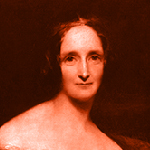
Sign up for our newsletter
The Read & Co. Newsletter will bring you our latest books, blogs, facts and of course news.

“Dream that my little baby came to life again –that it had only been cold & that we rubbed it before the fire & it lived.”
In the summer of 1816, the couple famously visited the poet Lord Byron at his villa beside Lake Geneva, in Switzerland. Storms and tumultuous weather (common in Shelley’s future novel) confined them to the indoors, where they and Byron’s assorted other guests took to reading to each other from a book of ghost stories. One evening, Byron challenged all his guests to write one themselves. The guests obliged, and Mary’s story went on to become Frankenstein. Mary and Percy married later that year, and eighteen months later, in 1818 Frankenstein was published. Mary was only 21, and the novel was a huge success. The first edition of the book included a preface from Percy, and many, disbelieving that a young woman could have penned such a horror story, thought that the novel was his.
In 1819, following the death of another child, Mary suffered a nervous breakdown. This was compounded three years later when her husband drowned. Widowed at just 25, Mary returned to England, determined to continue profiting from her writing in order to support her one surviving son. Between 1827 and 1840, she was busy as an author and editor, penning three more novels and a number of short stories. However, she never experienced further success of the sort that Frankenstein had brought. Her final decade was blighted by illness, and throughout the 1840’s she suffered from terrible headaches and bouts of paralysis in parts of her body. In 1851, at Chester Square, she died at the age of fifty-three from what her physician suspected was a brain tumour.Shelley underwent a period of critical neglect after her death, due in part to the onset of the realist movement. For a long time she was chiefly remembered as the wife of Percy Bysshe Shelley, and it was not until 1989 that a full-length scholarly biography was published. In recent decades, the republication of almost all her writing, including her short fiction, has stimulated a new recognition of its value, and scholars now consider Mary Shelley to be a major figure in Romanticism.
The Read & Co. Newsletter will bring you our latest books, blogs, facts and of course news.
Copyright © 2020 – present. Read & Co. Books Websites and Content. All rights reserved.